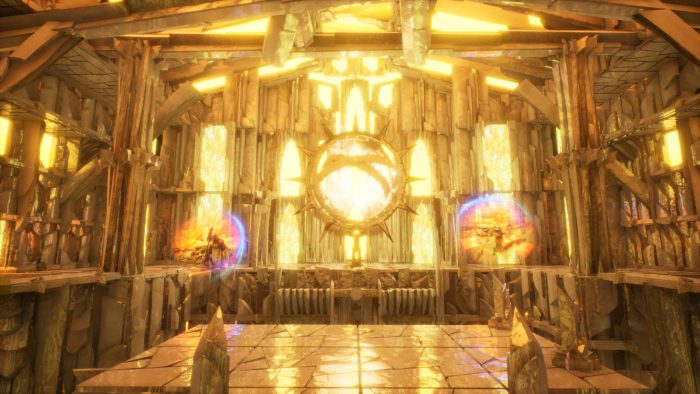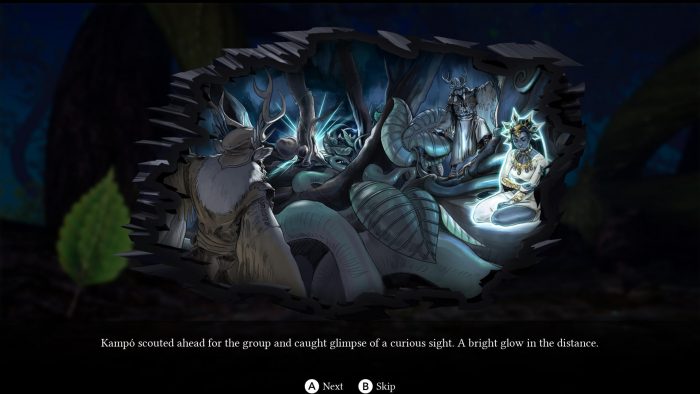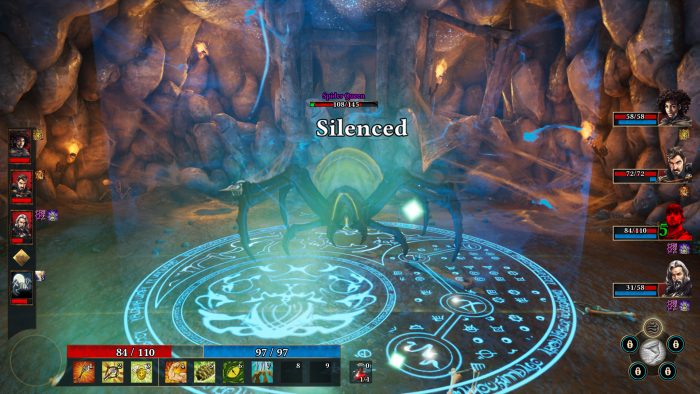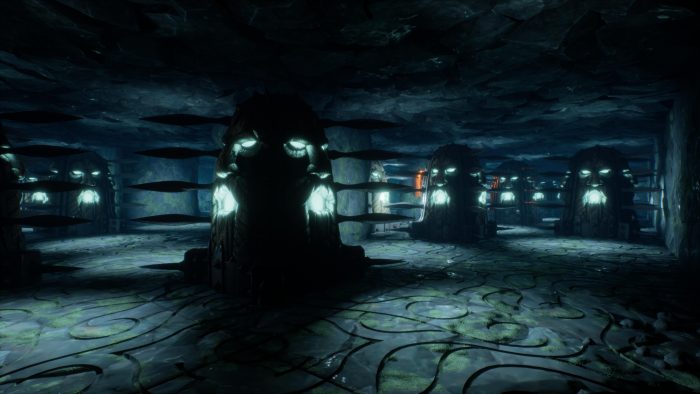From Zen Studios, a developer mostly known for pinball titles, comes Operencia: The Stolen Sun, a first-person dungeon crawl that puts just as much emphasis on dungeon exploration as its traditional turn-based combat system. The game certainly has a unique feel that separates it from other first person crawls like Etrian Odyssey or the related Persona Q series, with a setting that invokes a blend of mythology and fairytales as well as endearing characters who grow on you as the story progresses. Though it presents an immersive setting and interesting characters, Operencia does lack some polish in certain areas.

Operencia begins with a prologue where the player controls Attila, a king of legend in the titular land, fighting off a dragon leading an Underworld invasion. After this small introduction, we are brought to the present time, where the player-created protagonist, the son/daughter of a farmer, had a dream calling them to a cursed, flooded castle. There he or she meets Joska, a rogue who has also infiltrated the castle, and together they fight its army of cursed frog soldiers and rescue maidens. This serves only as a sort of second prologue however; upon exiting the castle our heroes find that the sun has disappeared and it’s likely a new plot from the Underworld is afoot. They set out to find where the sun has gone and meet many companions who join the party along the way, each with their own connections to the plot or each other.
Companions on this quest include the last remaining knight of one of the kingdoms, a celestial being, and a shaman of the world’s old faith, among others. While the main plot is straightforward with few surprising twists, Operencia does a good job developing these characters and their stories organically, mostly through dialogue while exploring dungeons or during battles. One of the best parts about the game is how, despite the high stakes, the party maintains a sort of banter (think Legolas and Gimli from LoTR) that can be entertaining and revealing. Furthermore, despite the story not being lengthy, most characters go through at least a small arc as they face their own challenges and work for their own motivations. If anything, the only downside is a fairly underdeveloped protagonist. They do contribute to the ongoing dialogue, but the prophetic nature of the start of their quest remains obscure even through the end of the game. Another plus to the storytelling is the setting, as Operencia takes our characters from (of course) dungeons to climbing the world tree and traversing the Underworld itself.

The gameplay here is around sixty percent exploration and forty percent turn-based combat. The combat system is standard, with your party of four heroes casting spells, attacking, and using potions in turn with the enemies in order of initiative. That said, there is some strategy to fighting and it isn’t all about attacking until either the monsters or your party is dead. Monsters tend to have various resistances to elements or effects that are displayed and must be taken into account. Moreover, there is a decent variety of buffs, debuffs, and DoTs that must be managed for optimal results. Despite all skills having energy requirements, you will find you are casting skills much more than using basic melee or ranged attacks. In the early portion of the game, this will run your characters out of energy quickly, but it can be regained in battle through defending for a turn. As the game progressed, though, I found that I had very few energy issues and was able to fight even long battles without worrying much. In fact, the difficulty of the battles felt extremely inconsistent to me. There were some groups of enemies that could kill half of my party if they got the jump on me, and others I wiped out with ease. This is something that seemed to happen throughout the game, and while it did help encourage ambushing enemies when possible, it also felt a little offputting, as some of the battles even in the endgame were quite easy.
Probably one of the best mechanics Operencia has is how the game handles character growth. As with most traditional RPGs, characters gain stat and talent points as they level up, the latter of which are used to progress through a small, fixed talent tree for each player. Unlike many other games, however, Operencia allows you to completely redistribute these points at any time. For example, I had been building my protagonist mage character (incidentally there is some modest character customization for the protagonist that allows you to pick from three classes at the beginning) as a fire mage of sorts, but when I came up against some lizardmen resistant to fire, I was able to completely change my specialization to ice and lightning based magic. This allows for a lot of exploration of different builds, and emphasizes getting the right build as more important than grinding (which Operencia has very little of). In fact, enemies do not respawn while you are in the dungeon at all, so you can effectively kill every enemy in the place, leaving it free for exploration and without worrying about being under-leveled for the next boss.

As noted before, exploration makes up a large part of Operencia‘s gameplay. Each chapter introduces a new dungeon to explore, with its own mechanics and gimmicks. You are also usually given one item per dungeon that can be used during exploration: a feather that can levitate heavy objects so you can move them or boots that slow down time to get through traps. I think this was a great concept that invoked a Legend of Zelda feel, but many of the items were vastly underused, with some items only getting a few uses in the whole game. Exploring the dungeons for me normally happened in two phases, one where I would explore freely and end up defeating all the enemies in the area and a second where I would complete any remaining exploration/puzzles free of enemy interference. The puzzles ranged widely from clever distractions, like using levers to fill up a bottle with a certain amount of fluid, to fairly frustrating parts that were less about the puzzle itself and more about combing through an area very carefully for a switch or object. Despite some of that frustration, I did somewhat enjoy the exploration and often found myself wanting to complete each map, in addition to finding secret paths and buried chests. None of the dungeons were particularly long, which was good. I never got tired of an area’s gimmicks, enemies, and aesthetics prior to moving on to the next location.
Graphically, Operencia is serviceable and only stands out in a few areas. There are occasional story scenes that use a beautiful storybook art style that aids the overall feel of the game. The character designs are varied, but you will only ever see your characters as body or portrait drawings in the menu or in dialogue boxes; they do not appear in the “world” as a 3D model at any time. The environments are quite varied, including a few traditional “dungeons” but also metal forests, underwater sections, and snowy areas. That said, the game’s environments are also relatively dark (in the literal sense) despite the variety, and I found myself turning up the brightness in my TV settings. There is also a certain homogeneity in the environment that can make it tough to find a certain switch or other item needed to progress. Some of the “puzzles” in the game were more difficult not for the strategy needed to solve them, but the ability to find the right area of the map to execute the required action. With the fairly large dungeons interspersed only with some enemies that disappear when vanquished — and no town areas or anything of the sort (the game just progresses from dungeon to dungeon) — Operencia can sometimes feel very empty. The enemy models are serviceable, but I feel many of the designs were expected fare for games of this genre (e.g. lizardmen, spiders, skeletons, etc.). Moreover, the UI seemed poorly formatted for playing on a TV and console setup. When I opened the menu, many of the buttons and text appeared small and difficult to see from my couch. I think this problem would be a nonissue on a PC, however, where the player is seated closer to the screen.

Operencia did not stand out for its sound and music either. Clearly the game was going for a more subdued musical score, which makes sense, as most of the time you are walking around and exploring the varied realms you find yourself in, so it’s nice that the game is not all high energy tunes. The sound design was such, however, that the music was so faint as to almost be hard to detect and hear. On the flip side, the character voices and sound effects seemed much louder and, while I’m sure the sound options can fine-tune this further, it was jarring as a default setting experience. It left me with very little impression as to how the music actually was, and though perhaps listening to the OST may shed some light on that, I found myself mostly playing the game in apparent silence aside from sound effects and dialogue. The sound effects came across as stock, with many of them reused for various spells and enemies. That said, the voice acting stood out as strong to me and meshed well with the character development and banter woven into the game’s dialogue during battles and exploration.
Overall, despite some of my criticisms on the game’s presentation, I do think Operencia was a fun experience. The main plot was fairly unengaging, but I enjoyed seeing the character interactions and came to know them as the game went on. While some of the exploring and puzzles got frustrating at times, there were other times when I did not want to turn the game off before fully exploring a floor or clearing an area. The game was not particularly difficult or long, around 20 hours of playtime, but there is definitely potential replay value with the difficulty settings (including permadeath and map-less options) and protagonist creation. Operencia can be inconsistent in presentation and difficulty, but I would lightly recommend it to anyone looking for a traditional RPG experience with emphasis on exploration. This may only be the beginning of the Operencia IP too, as the end of the game hints at more to come and Zen has already announced a VR release of the game — something I think could suit this title well.


